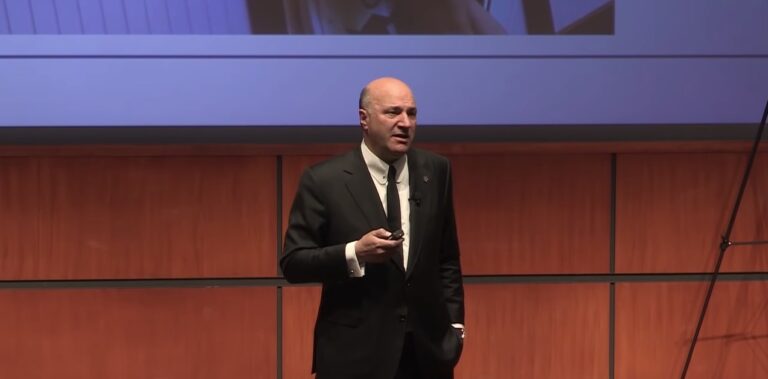
Recently, during an interview with Fox Business, Kevin O’Leary, a prominent investor from “Shark Tank,” recently expressed skepticism about the spot Bitcoin exchange-traded funds (ETFs) recently approved by the U.S. SEC, particularly criticizing their fee structures.
O’Leary is a Canadian businessman, author, politician, and television personality. He was born on July 9, 1954, in Montreal, Quebec, Canada. O’Leary is best known for his role as an investor on the reality TV show “Shark Tank,” where entrepreneurs pitch their business ideas to a panel of potential investors, including O’Leary, in hopes of securing funding.
O’Leary’s Stance on the US-Listed Spot Bitcoin ETFs
O’Leary stated that he personally would avoid investing in spot Bitcoin ETFs. His primary concern revolves around the fees associated with these funds. He pointed out that the fees for holding spot Bitcoin ETFs vary significantly, ranging from 0.21% to as high as 1.5%. For O’Leary, who considers himself a long-term holder of Bitcoin as a form of digital gold, these fees are unjustifiable and add no value to his investment strategy.
Positive Aspects of US SEC’s Approval of Spot Bitcoin ETFs
Despite his reservations about investing in Bitcoin ETFs, O’Leary acknowledged a silver lining. He believes that the approval of these ETFs could catalyze more regulatory clarity in the U.S. for the crypto and blockchain industry. He sees this development as a step forward in regulation, which could potentially re-energize Congress to focus more on digital payment systems, such as the U.S. dollar-based USDC and the pending Stablecoin Act.
Market Survival and Dominance Predictions
O’Leary also shared his predictions about the future of the US spot Bitcoin ETF market. He expressed doubt that all of the 11 approved ETFs would survive in the long term. According to him, only a few, perhaps two or three, will succeed, with major players like Fidelity and BlackRock likely to emerge as dominant forces. He attributed this to their extensive sales forces and market presence.
<!–
–>
<!–
–>
O’Leary emphasized that institutional investors, who are typically more cost-conscious, are unlikely to be attracted to spot Bitcoin ETFs due to the associated fees. He suggested that institutions would prefer direct investment in Bitcoin rather than going through an ETF, which incurs additional costs.
[embedded content]
On January 11, Dan Dolev, a senior analyst at Mizuho Securities, appeared on CNBC’s “The Exchange” to offer his insights into the emerging landscape of spot Bitcoin ETFs, focusing particularly on their implications for Coinbase and the broader cryptocurrency market.
Dolev pointed out that while these ETFs might initially seem beneficial, they present a significant challenge for Coinbase. He explained that Coinbase, by serving as a custodian for these ETFs, is transitioning from its highly profitable spot Bitcoin trading business to a role that yields considerably lower fees.
He elaborated that as a custodian, Coinbase’s earnings from fees would drop to about five basis points, a stark contrast to the approximately 250 basis points it charges for spot Bitcoin trading. This shift indicates a move from a lucrative business model to one that is less profitable.
Dolev also discussed the broader impact on the cryptocurrency market. He observed that the launch of spot Bitcoin ETFs signifies a pivotal change in Bitcoin trading’s pricing dynamics. He anticipated a marked decrease in trading prices, a trend he believes began with the ETFs’ launch, driven by heightened competition and alternative market options. This development, according to Dolev, could lead to a reduction in Coinbase’s ability to maintain its high trading fees.
Addressing the trading costs associated with Bitcoin, Dolev noted that Coinbase’s historically high fees were partly due to its status as one of the few reputable Bitcoin trading platforms in the U.S. However, with more platforms emerging, including those offering spot Bitcoin ETFs, he expects Coinbase’s fee structure to face pressure.
Dolev also touched upon the behavior of Bitcoin purists or long-term holders, noting that Coinbase profits primarily from active trading. If users opt to hold Bitcoin without trading, Coinbase does not generate revenue from these holdings. He suggested that this trend of holding without trading might become more prevalent, further affecting Coinbase’s revenue streams.
In his final remarks, Dolev compared Coinbase with other fintech platforms like Robinhood. He proposed that while platforms like Robinhood might benefit from the trading of new spot Bitcoin ETFs, Coinbase could encounter challenges due to this development. This situation, he implied, creates a diverse landscape where the introduction of Bitcoin ETFs could be advantageous for some platforms but detrimental for others like Coinbase.
[embedded content]
- SEO Powered Content & PR Distribution. Get Amplified Today.
- PlatoData.Network Vertical Generative Ai. Empower Yourself. Access Here.
- PlatoAiStream. Web3 Intelligence. Knowledge Amplified. Access Here.
- PlatoESG. Carbon, CleanTech, Energy, Environment, Solar, Waste Management. Access Here.
- PlatoHealth. Biotech and Clinical Trials Intelligence. Access Here.
- Source: https://www.cryptoglobe.com/latest/2024/01/shark-tank-star-kevin-oleary-critiques-spot-bitcoin-etfs-for-high-fees-foresees-market-dominance-by-major-players/



